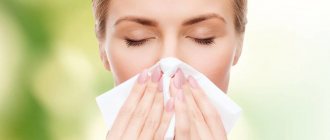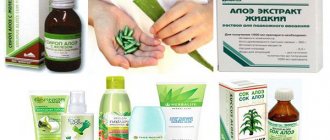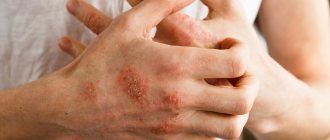Causes
There can be many reasons for allergic reactions to cosmetic products.
Such problems may be associated with the individual characteristics of the body and the low quality of the cosmetics themselves.
Low quality
Allergic reactions are quite often caused by the use of low-quality cosmetics. They may also be associated with the use of counterfeits of well-known brands.
As a rule, such cosmetics contain quite a lot of aggressive components that should not come into contact with the skin.
A kind of leader in the number of negative reactions is waterproof mascara, because it may contain black iron oxide.
Quite often, skin creams and gels cause harm. Unscrupulous manufacturers add strong flavors and bright dyes to them, which are harmful to health.
Spoiled cosmetics
Spoiled products are a fairly strong allergen.
Therefore, cosmetics that have expired should be mercilessly thrown away.
The same can be said about products that were stored in improper conditions.
They may thicken, change color or smell, or dry out.
In order not to cause harm to your health, it is very important to observe the storage periods:
- dry cosmetics can be stored for about 3 years;
- products with a creamy texture can be stored for a maximum of 1 year;
- mascara and foundation can be used for no longer than 3-6 months;
- lipstick can be used for about 1 year, and gloss - about 6 months;
- biocosmetics cannot be used for more than 3 months.
To make cosmetics last longer, you need to store them correctly. This should be done at normal humidity and room temperature.
Body condition
Women who have sensitive skin, food allergies, and allergic dermatitis are at risk for developing this disease.
Also, a negative reaction may occur due to individual intolerance to the components of the product.
Those with sensitive skin should be very careful when choosing cosmetics.
It is best to choose hypoallergenic products that are designed specifically for this type.
Additional factors that may increase the likelihood of negative reactions include the following:
- sudden changes in diet and range of food;
- excessive consumption of spicy foods, alcoholic beverages, coffee;
- stressful situations;
- past illnesses;
- taking antibacterial drugs;
- vitamin deficiency;
- aggressive cosmetic procedures - for example, peeling.
Combination conflict
Some girls have a situation where they are not allergic to a specific product, but if they use it with other cosmetics, a negative reaction is observed.
This indicates oversaturation of the skin with a certain ingredient.
Therefore, the use of foundation, powder and blush from different manufacturers may well provoke unexpected reactions.
However, such results apply not only to cosmetics.
The use of medications, antibiotics, and antidepressants can also change the body's response to care products.
Useful tips
In order not to encounter this unpleasant disease, it is important to adhere to certain rules:
You should always remember the rules of hygiene. Before applying makeup, you need to wash your hands and wipe your skin; decorative cosmetics are an individual product, so you should not let your friends use them; Your cosmetic bag should always be clean. In addition, it must be left closed; Do not expose products to sunlight or high temperatures; It is not recommended to use eye products if you have been diagnosed with any diseases - for example, conjunctivitis. When you get rid of the infection, the contents of your cosmetic bag will have to be updated; Do not use products that have changed their appearance or smell; It is very important to clean cosmetic brushes and applicators frequently; It is recommended to choose products with a small number of ingredients; before using a new product, you need to test for an allergic reaction; perfume is recommended to be applied to clothes; All notes regarding the hypoallergenicity of cosmetics do not guarantee safety. The fact is that not every company undergoes such testing.
Allergies to cosmetics are considered quite common.
This disease is accompanied by very unpleasant symptoms and significantly reduces the quality of life.
Therefore, you should be extremely careful when choosing skin care products and applying makeup.
An allergy to cosmetics is a negative reaction of the body to irritants and allergens from cosmetic products. And swelling in case of allergies to cosmetics will be an obligatory component. Due to the increase in allergic reactions and the number of allergy sufferers among the population, this phenomenon occurs very often. According to statistics, a third of the world's population suffers from allergies today. Allergies on the face from cosmetics can occur due to the use of masks and scrubs, cleansing lotions, foams, tonics, as well as powder, creams, blush, eye shadow, mascara, lipstick, etc.
Compound
Allergic reactions to cosmetic products directly depend on the ingredients included in their composition.
Preservatives
Similar components are used to extend the shelf life of cosmetics. They are usually quite aggressive chemical products.
The role of preservatives is most often played by salicylic or benzoic acid.
If there are a lot of such substances in cosmetics, the risk of developing allergies increases.
Therefore, experts recommend choosing products with a short shelf life.
They usually contain natural ingredients in the form of beeswax or sorbic acid.
However, it must be taken into account that allergies can also occur to these components.
Fragrances
To add fragrance to cosmetics, manufacturers use various fragrances. In this case, allergic reactions can be associated with both natural and synthetic components.
The cheaper the product, the higher the likelihood of using artificial fragrances.
If you are allergic to essential oils, then products with natural ingredients are definitely contraindicated for you.
Citrus and bergamot oils especially often cause negative reactions.
It is important to consider that the richer the smell of the product, the more flavorings it contains.
Animal fats
Allergic reactions often occur not only to artificial components, but also to natural ingredients.
The composition of cosmetic products should be correlated with those products that you do not tolerate well.
For example, if you are allergic to sheep's wool, then most likely products with lanolin will not suit you.
Many products contain animal allergens - in particular, milk and eggs.
Since the components of cosmetics are able to penetrate into the blood, they often provoke the occurrence of unpleasant symptoms.
Pigments
The most allergenic components of cosmetics are aniline dyes, which are present in lipstick, and metal salts contained in mascara and eyeliners.
The brighter the shade of lipstick, the more aggressive components it contains.
When choosing cosmetics, it is recommended to give preference to those products that include natural ingredients.
Natural cosmetics = safe cosmetics?
Serum with a high content of vitamin C, tonic with essential oils and lemon, sea buckthorn cream. And no “chemistry”! Sounds tempting. True, this does not mean at all that an allergic reaction will not occur to these extremely “natural”, environmentally friendly products.
This may surprise you, but the most hypoallergenic products are synthetic, since they do not contain proteins that are primarily perceived by the immune system as foreign to the body and requiring immediate destruction. If you pay attention to children's cosmetics from serious large companies, the number one component there will be mineral oil. And not because “they want to destroy children” and “bathe them in oil,” but because this is the safest component that will not cause, for example, Quincke’s edema.
Symptoms of manifestation
The manifestations of negative reactions to the use of cosmetics can be different - it all depends on what components they contain.
Allergies to cosmetics on the eyes
A reaction in the eyes may occur after using mascara, eye shadow, pencil and other products that come into contact with the skin of this part of the face.
Most often, allergies manifest themselves in the form of various forms of conjunctivitis.
In this case, redness and increased tearing of the eyes occur. Sometimes these symptoms are also accompanied by the appearance of mucous discharge.
In acute reactions, in addition to conjunctivitis, severe glass-like swelling of the mucous membrane of the eye occurs.
If an allergy to cosmetics, the symptoms of which are severe, does not go away, you should immediately consult an ophthalmologist or allergist.
For centuries
Quite often, after applying eye shadow or eyeliner, a reaction occurs on the eyelids, which manifests itself in the form of allergic dermatitis.
In this case, the skin of the affected area turns red, rashes appear, itching and increased swelling occur.
On the face
An allergy to cosmetics on the face can appear after using all kinds of masks or scrubs.
It is also often led to:
- powders;
- creams;
- shadows;
- carcasses;
- lipsticks;
- blush.
The main symptoms of this reaction on the face include the following:
- sensation of itching and burning in the area of contact with the product;
- inflammation and hyperemia of the skin;
- mucous discharge in the eye area;
- dryness and swelling of the lips;
- acne;
- violation of nasal breathing;
- dark circles around the eyes associated with swelling and spasm of the eyelids.
On the neck
The use of various body creams or lotions, as well as shower gels, can cause rashes to appear in the neck area.
Such symptoms may be accompanied by severe itching and burning. Swelling of varying degrees of severity often occurs.
On hands
A reaction on the skin of the hands is usually associated with the use of low-quality cream.
In this case, small rashes or large blisters may appear, especially in the area of direct contact with the product.
The skin may also peel, and itching and swelling often occur.
Find out the causes of poplar allergies. Has your child become allergic to casein? The solution is in this article.
On the body
Allergic reactions on the body are associated with the use of inappropriate shower gel or body cream.
In this case, red rashes, itching, and peeling of the skin appear.
Sometimes the disease manifests itself as watery blisters, especially if the skin is scratched or scratched.
As a rule, rashes are more likely to affect dry and cracked skin. They are also quite often localized where the epithelium is thinnest.
How we take care of our clients
pays close attention to cosmetic ingredients. We use components from trusted laboratories that have the necessary safety and quality certificates. Before release, our products are tested in laboratories. For your convenience, we place detailed information about the composition and features of the use of our products on the packaging and in product cards in the official online store shop.aravia-prof.ru.
In case of an undesirable skin reaction to the product, we ask you to send us an email
- photos of skin reactions;
- photographs of the product so that the batch number is visible;
- a detailed story about exactly how you used the product;
- additional contacts for prompt communication.
We will then be able to help you and determine the possible cause of the reaction, and decide as quickly as possible how to proceed.
What pregnant women need to know
During pregnancy, women are more prone to allergies. If there are no individual reactions, you can continue to use your usual cosmetics.
However, experts advise giving preference to products with natural ingredients, which contain a note about the possibility of use during pregnancy.
Decorative products must have a mention of hypoallergenic properties. It is also very important to carefully monitor the expiration date of the products.
Diagnostic methods
If the reaction is mild, it is enough to exclude the use of cosmetic products and simply observe the reaction of your skin.
Then you should try using the products one by one and monitor the skin condition again.
If the allergy is severe, you should consult a doctor.
The specialist will make the correct diagnosis based on the results of a patient interview and analysis of characteristic symptoms.
If allergic contact dermatitis is suspected, skin patch tests may be prescribed.
In this case, a small concentration of allergens is applied to the skin, after which the doctor needs to check the reaction.
Thanks to this, it will be possible to identify the cause of the disease.
The essence of the problem
REAL STORY: I cured my allergies in just 1 course and got a fluffy cat...
Find out how >>
The negative response of the body, or rather its immune system, to the aggressive components of various cosmetics manifests itself in the form of swelling, itching, watery eyes, redness, and rashes on the skin. In severe cases, anaphylactic shock can develop and be fatal, because such a reaction of the body is very fleeting. Such reactions can occur not only in allergy sufferers, but also in any person, regardless of age, season, gender, since the compositions of cosmetic products contain dozens of constituent agents.
The reaction can appear in any part of the body, but more often at the site of contact with the allergen: face, eyes, eyelids, lips, ears, scalp, etc. Usually the first symptom of an allergy to cosmetics is a rash in the form of bright red spots that tend to to fusion, itchy very much, slightly raised above the skin. If allergy symptoms are constantly present on the face when using cosmetics, they speak of contact allergic dermatitis.
ABOUT THE MOST IMPORTANT
Symptoms of a weakened immune system include frequent colds, other infections, and cancer. Strengthen your immune system...
Read more >>
Treatment options
When the first symptoms of the disease appear, you should immediately wash off your makeup using plenty of water.
If you painted your eyelashes or eyelids, you should definitely rinse your eyes with tea.
Chamomile decoction is also suitable for this purpose.
Then you can take an antihistamine - Suprastin, Erius, Zyrtec. With its help it will be possible to eliminate acute manifestations of allergies. In difficult cases, treatment must be prescribed by a doctor.
Once symptoms of the pathology appear, you should stop using any cosmetic products.
This should be done until all signs disappear.
Then you can try using the products, but only one at a time. It is important to monitor the reaction over several days. If allergies do not appear, you can use the following product.
Studying the label
To prevent unwanted reactions from cosmetics, you need to carefully study its label.
Manufacturers of such products must indicate all the ingredients included in their composition.
However, some cosmetologists do not reveal all the secrets.
For example, products that are labeled “fragrance-free” may well contain them, but in small quantities.
The main purpose of these components is to mask the chemical odor.
If the packaging mentions the naturalness of the product, this indicates that it contains plant and animal components.
If the product is marked “non-comedogenic”, this indicates the absence of substances that pollute the pores.
Read what to do if you are allergic to kiwi. How to replace lidocaine if you are allergic to it? The answer is here.
Is it possible to be allergic to aloe vera? Read on.
Is it possible to prevent allergies?
A few rules to help you protect yourself:
- Study the ingredients of the products before purchasing.
The most common triggers for rashes and itching are natural fragrances (essential oils), some preservatives, dyes (mainly found in pigments in decorative cosmetics and hair dyes), honey and its derivatives. Rarely: mineral oils, plant extracts, minerals, lanolin. This doesn't mean you should avoid these remedies, but it's best to be on the lookout. Especially with severe skin sensitivity. - Test new cosmetics before use.
To do this, apply a little product to the crook of your elbow and wait up to 48 hours. - Follow the rules for storing products
and do not use cosmetics after the expiration date. - Always follow the manufacturer's recommendations.
Do not overexpose masks, do not apply creams to the mucous membranes, and do not use products intended for professionals without the appropriate skills.










